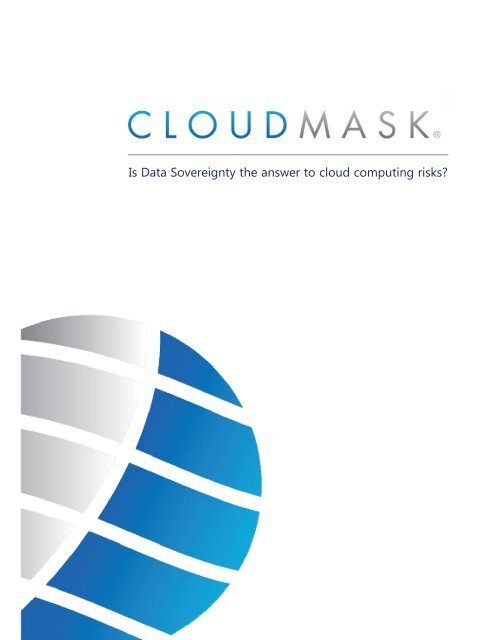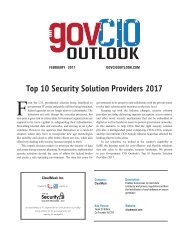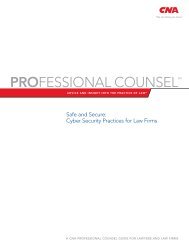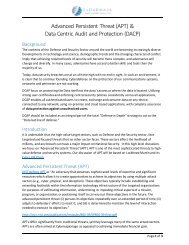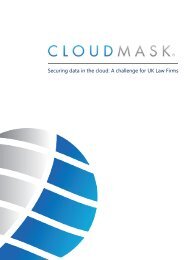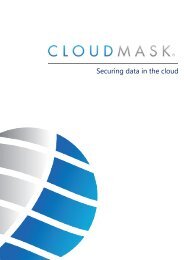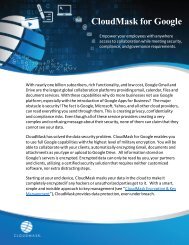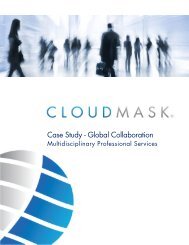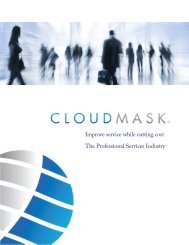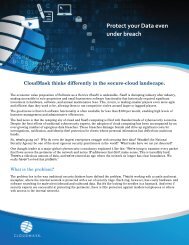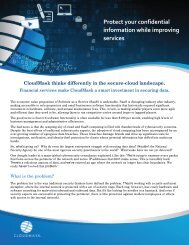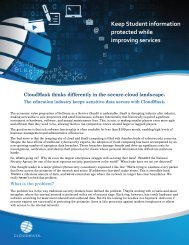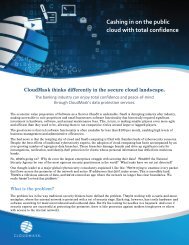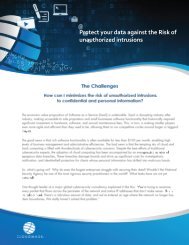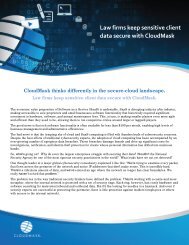Is Data Sovereignty the answer to cloud computing risks
The entire domain of cloud technology has grown more complex over the years even as the risk of breaches continues to increase. Complexity is increasing further with the changes in law being brought about to cover issues of data residency and data privacy. The occasions of government agencies demanding that Cloud Service Providers (CSP) provide them with access to data - both of enterprises and of individuals - are increasing. Many users who are based outside the US are particularly worried that any data they store in a Data Center based in the US or with a US based CSP may be vulnerable to surveillance by US agencies.
The entire domain of cloud technology has grown more complex over the years
even as the risk of breaches continues to increase. Complexity is increasing further
with the changes in law being brought about to cover issues of data residency and
data privacy.
The occasions of government agencies demanding that Cloud Service Providers
(CSP) provide them with access to data - both of enterprises and of individuals - are
increasing. Many users who are based outside the US are particularly worried that
any data they store in a Data Center based in the US or with a US based CSP may
be vulnerable to surveillance by US agencies.
You also want an ePaper? Increase the reach of your titles
YUMPU automatically turns print PDFs into web optimized ePapers that Google loves.
<strong>Is</strong> <strong>Data</strong> <strong>Sovereignty</strong> <strong>the</strong> <strong>answer</strong> <strong>to</strong> <strong>cloud</strong> <strong>computing</strong> <strong>risks</strong>?
<strong>Is</strong> <strong>Data</strong> <strong>Sovereignty</strong> <strong>the</strong> <strong>answer</strong> <strong>to</strong> <strong>cloud</strong> <strong>computing</strong> <strong>risks</strong>?<br />
The entire domain of <strong>cloud</strong> technology has grown more complex over <strong>the</strong> years<br />
even as <strong>the</strong> risk of breaches continues <strong>to</strong> increase. Complexity is increasing fur<strong>the</strong>r<br />
with <strong>the</strong> changes in law being brought about <strong>to</strong> cover issues of data residency and<br />
data privacy.<br />
The occasions of government agencies demanding that Cloud Service Providers<br />
(CSP) provide <strong>the</strong>m with access <strong>to</strong> data - both of enterprises and of individuals - are<br />
increasing. Many users who are based outside <strong>the</strong> US are particularly worried that<br />
any data <strong>the</strong>y s<strong>to</strong>re in a <strong>Data</strong> Center based in <strong>the</strong> US or with a US based CSP may<br />
be vulnerable <strong>to</strong> surveillance by US agencies.<br />
A number of CSPs that are based<br />
outside <strong>the</strong> US are taking advantage of<br />
<strong>the</strong>se doubts <strong>to</strong> suggest that domestic<br />
data centers may offer a good way <strong>to</strong><br />
circumvent <strong>risks</strong> associated with privacy<br />
and data residency. As an example,<br />
one need only look at SAP. The German<br />
software giant recently announced that<br />
it was setting up data centers in Canada<br />
so that Canadian businesses could use<br />
SAP solutions without worrying about<br />
US agencies’ access <strong>to</strong> <strong>the</strong>ir data. This<br />
approach seems <strong>to</strong> be successful and<br />
research has indicated that nearly 60% of<br />
Canadian businesses prefer <strong>to</strong> keep <strong>the</strong>ir<br />
data within <strong>the</strong> country.<br />
<strong>Is</strong> this <strong>the</strong>n <strong>the</strong> way data centers will<br />
develop in future? And, more importantly,<br />
is this a correct solution? Will ‘sovereign<br />
<strong>cloud</strong>s’ be <strong>the</strong> right approach <strong>to</strong> take?<br />
CloudMask research and study do not<br />
support this. Let us see why.<br />
To begin with, one important reason<br />
why large industries embraced <strong>cloud</strong><br />
<strong>computing</strong> was <strong>to</strong> put <strong>the</strong>ir data <strong>to</strong>ge<strong>the</strong>r,<br />
make operations more coherent and<br />
implement standard business rules.<br />
Working from a common data center<br />
would simplify workflow and create<br />
a single view of <strong>the</strong>ir data. If a large<br />
enterprise were <strong>to</strong> split its data in<strong>to</strong> a<br />
number of different ‘sovereign<br />
<strong>cloud</strong>s’ <strong>the</strong>n it would end up creating<br />
silos in different countries.<br />
With even smaller businesses having<br />
multinational operations, <strong>the</strong>se silos would<br />
not be restricted <strong>to</strong> large enterprises alone.<br />
It is also difficult <strong>to</strong> visualize a situation<br />
where <strong>cloud</strong> providers would be willing<br />
<strong>to</strong> put up data centers in every possible<br />
country.<br />
‘‘It is clear that a<br />
sovereign data model<br />
does not address<br />
<strong>risks</strong> associated<br />
with data residency<br />
and surveillance by<br />
governments.’’<br />
Even if one were <strong>to</strong> keep data out of<br />
data centers in <strong>the</strong> US, agencies of <strong>the</strong><br />
US government would still be able <strong>to</strong> get<br />
access <strong>to</strong> data <strong>the</strong>se CSPs hold. In fact <strong>the</strong><br />
situation could be worse because while<br />
agencies are subjected <strong>to</strong> transparency<br />
and oversight laws in <strong>the</strong> US, a non-US<br />
CSP would be classified as a foreign<br />
entity and <strong>the</strong> oversight rules will be<br />
more relaxed and lesser enforceable.<br />
Insider threats remain <strong>the</strong> same whe<strong>the</strong>r<br />
data is s<strong>to</strong>red in <strong>the</strong> US or elsewhere. An<br />
administra<strong>to</strong>r with <strong>the</strong> proper privileges<br />
could always access data no matter where<br />
it is s<strong>to</strong>red.<br />
IS DATA SOVEREIGNTY THE ANSWER TO CLOUD COMPUTING RISKS?
It is <strong>the</strong>refore clear that a sovereign data model does not address <strong>risks</strong> associated with<br />
data residency and surveillance by governments. Any CSP selling this as a solution has<br />
obviously not given <strong>the</strong> matter deep enough thought. Besides, if a CSP were <strong>to</strong> provide<br />
SaaS solutions from many different locations, it would end up losing cost advantages,<br />
efficiency and agility. While one cannot ignore <strong>the</strong> <strong>risks</strong> of data disclosure and<br />
government surveillance, simply changing geographic locations of data centers is not a<br />
viable solution.<br />
Smart Secure Information Sharing<br />
CloudMask has developed a new<br />
innovation called Selective Intelligent<br />
Masking (SIM).<br />
SIM allows organizations <strong>to</strong> protect<br />
very specific electronic information. SIM<br />
enables users, or those responsible for<br />
data privacy, <strong>to</strong> mask <strong>the</strong> information that<br />
can identify individuals and at <strong>the</strong> same<br />
time share data that is not sensitive. Users<br />
can leverage SIM <strong>to</strong> apply very specific<br />
sharing rights <strong>to</strong> <strong>the</strong>ir information. The<br />
sharing rights specify what data can be<br />
shared and with whom.<br />
This smart secure information sharing<br />
allows users, or information owners, <strong>to</strong><br />
stipulate <strong>the</strong>ir specific information sharing<br />
policies <strong>to</strong> electronic documents and<br />
applications.<br />
‘‘SIM enables users <strong>to</strong><br />
mask <strong>the</strong> data that can<br />
identify individuals.’’<br />
SIM is specifically designed <strong>to</strong> enable<br />
smart secure sharing over public <strong>cloud</strong><br />
applications, however, it can be applied<br />
<strong>to</strong> any application.<br />
SIM is independent of <strong>the</strong> public <strong>cloud</strong><br />
service provider and operates as an<br />
extension in <strong>the</strong> browser. It is simple <strong>to</strong><br />
install and operate and protects your<br />
information from <strong>the</strong> moment it is created<br />
throughout its entire lifecycle.<br />
Watch our video and demo at<br />
www.vimeo.com/<strong>cloud</strong>mask<br />
IS DATA SOVEREIGNTY THE ANSWER TO CLOUD COMPUTING RISKS?
To find out more about how CloudMask and SIM can<br />
protect your information, extend your security or privacy<br />
policies, and enable secure collaboration across your<br />
supply chain visit www.<strong>cloud</strong>mask.com or<br />
contact info@<strong>cloud</strong>mask.com.<br />
Copyright© CloudMask


